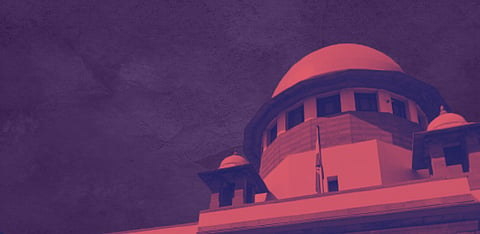

A CJI-led Bench opposed the petition, with the CJI saying in court, "When you say that space for the Opposition has shrunk, the remedy is in that space, the political space; not the court."
—
THE Supreme Court on Wednesday refused to entertain a petition filed by a group of 14 political parties on March 24 seeking guidelines for the Central Bureau of Investigation (CBI) and the Directorate of Enforcement (ED) for making arrests of politicians only if they satisfy a triple-test: they are a flight risk, there is a reasonable apprehension that the person sought to be arrested will tamper with evidence, and there is a reasonable apprehension that the person sought to be arrested would intimidate/influence witnesses.
A division Bench comprising Chief Justice of India (CJI) Dr D.Y. Chandrachud and Justice J.B. Pardiwala noted that politicians do not enjoy greater immunity than ordinary citizens. It also added that it could not issue sweeping guidelines in abstract.
Senior advocate Dr Abhishek Manu Singhvi, for the petitioners, sought to withdraw the petition, which was allowed by the Bench. The petitioners were the Indian National Congress, the Dravida Munnetra Kazhagam, the Rashtriya Janata Dal, the Bharat Rashtra Samithi, the All India Trinamool Congress, the Aam Aadmi Party, the Nationalist Congress Party, the Shiv Sena (Uddhav Balasaheb Thackeray), the Jharkhand Mukti Morcha, the Janta Dal (United), the Communist Party of India (Marxist), the Communist Party of India, the Samajwadi Party, and the J&K National Conference. Together, they represent 42.5 percent of the votes cast in the 2019 General Elections, and hold power in eleven states and Union territories.
"Laying down general guidelines dehors the facts of the case cannot be done. We need to have facts in a case or group of cases," CJI Dr Chandrachud observed.
The Bench also seemed unimpressed with the averment in the petition that regardless of the gravity of the offence, no politician ought to be arrested if they do not satisfy the proposed triple test. CJI Dr Chandrachud asked how the court could carve out such an exception only for politicians.
The petition also demanded that no arrest ought to be made in cases involving cognisable offences, including those punishable by over seven years of imprisonment, if they do not involve serious bodily violence or harm. It clarified that bodily harm would include homicide, sexual violence, terrorism and the like, punishable with more than seven years imprisonment, which would be outside the remit of the guidelines the petitioners were asking for.
Unimpressed, the CJI pithily questioned if the court could say not to arrest an accused in a case of financial scams worth crores of rupees just because bodily harm is not involved in the matter.
Dr Singhvi vociferously tried to convince the bench to admit the petition. He drew the attention of the court to an analysis of investigations launched by the ED which shows that between 2004 and 2014, 26 political leaders were probed, of whom 14 were from the Opposition (around 53 percent), whereas from 2014 onwards, of the 121 political leaders under investigation, 115 (that is, over 95 percent) have been from the Opposition.
A similar trend has been noted in the operation of CBI. Between 2004 and 2014, the CBI investigated 72 political leaders, of whom 43 were from the Opposition (under 60 percent). Post-2014, of the 124 political leaders investigated by the CBI, 118 have been from the Opposition (over 95 percent).
On the basis of this data, Dr Singhvi sought to argue that there has been a skewed application of the law by the CBI and the ED. This, Dr Singhvi argued, led to an undemocratic playing field because the Opposition has to spend substantial part of its energies just in fighting these cases. He clarified that the guidelines he was asking for are to be made applicable prospectively and thus there would not be any interference in the existing investigation.
Dr Singhvi submitted that mass arrests are a threat to democracy and a sign of authoritarianism. The process is turning into punishment, he added. The CJI retorted, saying, "When you say that space for the Opposition has shrunk, the remedy is in that space, the political space; not the court."